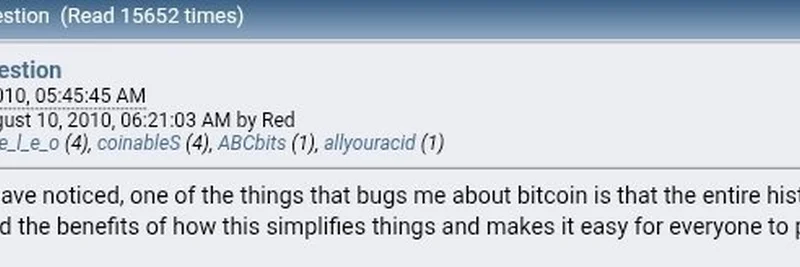Have you ever wondered how different Bitcoin might be if privacy features were baked in from the start? Well, a recent tweet from Mert, the CEO of Helius Labs, sheds light on a fascinating piece of crypto lore from 2010. In it, he highlights a Bitcoin forum discussion where a user suggested making transactions private using zero-knowledge proofs (ZK for short), and Satoshi Nakamoto himself responded. Let's break this down step by step and see why it's still relevant today, especially for those in the meme token space looking at privacy innovations.
The Original Forum Suggestion
Back in August 2010, on the Bitcointalk forum – the go-to spot for early Bitcoin enthusiasts – a user named "Red" proposed an idea to enhance Bitcoin's privacy. The suggestion was to use zero-knowledge proofs, a cryptographic method that lets you prove the validity of a transaction without revealing any sensitive details like amounts or addresses. This would address one of Bitcoin's key traits: its fully public transaction history, which makes it easy to verify coins but also exposes everything to prying eyes.
Here's a screenshot from the forum post capturing the essence of the idea:
Red argued that while the public ledger simplifies validation, adding ZK could make Bitcoin "better" by introducing optional privacy. It's wild to think this conversation happened just a year after Bitcoin's launch, when the whole crypto world was still in its infancy.
Satoshi's Intriguing Response
Satoshi Nakamoto, Bitcoin's mysterious creator, didn't dismiss the idea outright. In fact, he acknowledged its potential benefits. He replied that implementing ZK would indeed improve Bitcoin by allowing private transactions while keeping the network verifiable. However, Satoshi admitted he didn't know how to pull it off technically at the time. This shows even the genius behind Bitcoin had limits and was open about them.
Check out this image of Satoshi's response from the thread:
This exchange is a goldmine for crypto historians. It highlights how privacy was on developers' minds early on, but the technology wasn't ready yet. Fast forward to today, and ZK proofs are everywhere – powering projects like Zcash for shielded transactions and even scaling solutions on Ethereum like zk-rollups.
Why This Matters for Meme Tokens and Blockchain Today
In the world of meme tokens, where hype and community drive value, privacy isn't always top of mind. But imagine meme coins with built-in ZK features: you could trade your favorite dog-themed token without broadcasting your wallet balance to the world. This could prevent front-running by bots or protect users in regions with strict regulations.
Technologies like ZK-SNARKs (Zero-Knowledge Succinct Non-Interactive Arguments of Knowledge) have evolved since 2010, making what seemed impossible back then a reality now. Chains like Solana are experimenting with ZK compression for cheaper transactions, and privacy-focused meme projects could be the next big thing. If you're building or investing in meme tokens, keeping an eye on ZK advancements could give you an edge – after all, privacy might just be the killer feature that turns a fun meme into a serious contender.
This bit of lore reminds us how far crypto has come. Satoshi's humility in saying "I don't know how" paved the way for innovators to figure it out. For more on this tweet and the discussion it sparked, check out the original post on X.
What do you think – would Bitcoin be even more dominant with early ZK privacy? Drop your thoughts in the comments!


